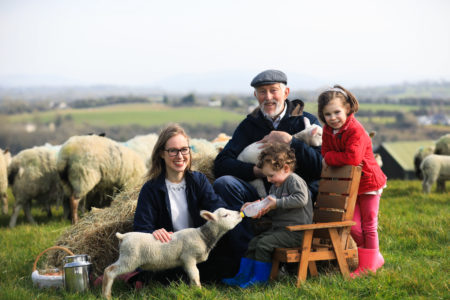21 April 2022
By Tom Collins
tom@TheCork.ie
Farming News
Rising costs are the biggest challenge facing farmers according to an annual Farm Report conducted by ifac, Ireland’s farming, food and agribusiness specialist professional services firm. Given that 51% have already seen costs increase due to Brexit, 60% of Irish farmers say the biggest concern for their business for 2022 is increased input costs that are currently impacting all the primary farm inputs including fertiliser, feed and energy.
Ifac’s fourth annual Irish farm survey, contained in the report, reveals what is really on the minds of Irish farmers – the opportunities and the challenges they are facing across rural Ireland. This includes the positive role of technology in increasing farm efficiencies and reducing the physical demands for employees, the universal challenge of reducing greenhouse gases, and farmers being able to find the time to tackle financial planning to protect their families and farms for the future.

Representing three farming generations, Caroline Alcorn, Audit Manager at ifac, Samuel Harper (back), Liam (aged 3) and Evelyn (aged 5) Alcorn (front) on their family farm in Co. Kilkenny (Nore Valley) for the spring launch of ifac’s Farm Report 2022.
Finding and retaining employees has become a challenge for many – 21% say it’s a big concern, particularly in the dairy sector. 1 in 3 beef farmers are struggling to balance farming with their off-farm job and, across the board, 77% of farmers say they would hire non-EU people with the right skills.
With the UN warning of a climate tipping point on emissions, encouragingly, farmers are not shying away from sustainability or the gravity of the environmental challenges ahead. While some are understandably concerned about the additional cost burden (38%) and even more (40%) believe that other sectors need to play their part too, 94% of farmers believe in the need to reduce greenhouse gas on farms. Also, as determined innovators, 97% of farmers are open to incorporating renewable energy on their farms yet a third don’t know where to start, demonstrating a sizeable opportunity for Irish farmers.
The survey also highlights for a fourth consistent year in a row that financial planning, in particular succession planning, is a topic that still requires focus. While action has been taken and reassuringly the numbers have doubled since 2019, two thirds (67%) of Irish farming families have yet to start their succession plans. This remains a persistent opportunity because careful succession planning can empower families and provide a sustainable future for their farm business.
Other key takeaways include:
Overall outlook
· 58% have a positive outlook on farming for 2022.
Financial planning
· Concerning succession, 1 in 5 say the lifestyle is not appealing enough for the next generation (up from 16% in 2021)
· Almost half (47%) of Irish farmers don’t have a Will
· Only 17% have an Enduring Power of Attorney (22% don’t know what it is)
· 1 in 5 (20%) don’t have life cover
· 1 in 3 are concerned about saving for retirement, and 25% worry about saving for education.
Sustainability
· 42% of farmers would consider organics
· 40% of farmers believe changing how people value food would help tackle climate change, while 36% believe educating consumers on how food is produced would help.
Technology
· 52% say cost is the biggest barrier to adopting technology
· 32% use technology to increase farm efficiencies
· 21% use technology to reduce the physical burden on employees.
Minister for Agriculture, Food and the Marine, Charlie McConalogue T.D. said:
“I welcome ifac’s Farm Report 2022. Input costs, as outlined in this report, are undoubtedly impacting most farmers this year and will be a major challenge to profitability. While we are closely monitoring the situation in Ukraine, both I and my Department, just like ifac, are working to support farm families and their businesses. This includes two separate support packages for the pig sector; a direct aid for the horticulture sector and the Tillage Incentive Scheme with a €12 million budget.
“The challenge now facing all of us in society, including farmers, to reduce emissions is vast and, in line with the targets for agriculture in the Climate Action Plan, I am very encouraged to see that 94% of Irish farmers say reducing greenhouse gasses is important.
“Also, resilience is at the core of our farming sector and it’s heartening to see that more Irish farmers than last year have a positive outlook for the future. This is the shared goal of my Department and together with my colleagues across Government, we want to make sure that farming remains sustainable and will continue to generate fair incomes for farm families and future generations. I wish ifac every success with this timely report.”
John Donoghue, Chief Executive of ifacsaid:
“The findings from our farm survey give us invaluable insights into Irish farmers’ lives in 2022. As Covid-19 begins to dissipate any anticipated relief has been overshadowed as other significant challenges have emerged. Rising costs are now the biggest challenge facing farmers, heightened by escalating prices and supply shortages because of the tragic and needless events in Ukraine. In parallel, finding and retaining employees has become a big concern for many, particularly in the dairy sector, and succession planning remains a recurring theme year after year that still requires urgent focus.
“However, overall, positivity still abounds among Irish farmers – almost 60% have a positive outlook on farming for 2022. Also, as expected, sustainability is a key aspect of this year’s report, with almost all farmers in agreement that reducing greenhouse gases is essential. With the right support and a financially viable framework, Irish farmers can take a lead role in driving positive climate action in global agriculture.
“At ifac, we have been supporting and advising farming families for 47 years by providing expert, tailored advice that works specifically to help them increase the efficiency of their businesses. We are committed to working closely with all of our clients through these challenges, adjusting plans and budgets as events unfold.
Ifac’s Irish Farm Report 2022, titled ‘The Innovators – farmers embracing change’, features analysis and tips for each sector (including dairy, beef, sheep, tillage, poultry, pigs and forestry), as well as informative case studies and helpful articles for Irish farmers on topics such as technology, climate action, succession, farm structures, pensions, hiring, etc.
Ifac Farm Report 2022 – www.ifac.ie/irish-farm-

